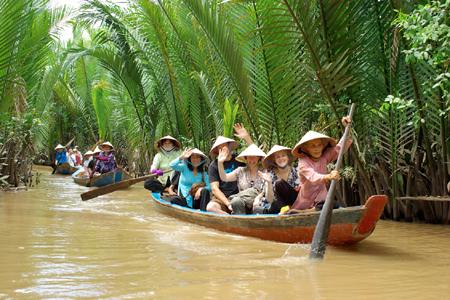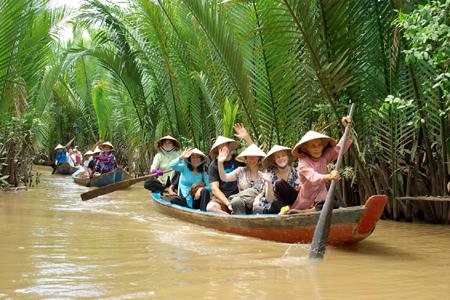Ben Tre boasts a 65km long coastline, mangrove forests with rich flora and fauna, a complex network of canals and numerous islets and sandbanks, resulting in a mild and cool climate year-round. It is also an oasis formed from three islet chains (Bao islet, Minh islet, and An Hoa islet) and enriched by the alluvial deposits of four rivers: Tien, Ham Luong, Ba Lai, and Co Chien. The soil is highly fertile and suitable for growing many types of fruit, the most famous of which is the coconut tree. Ben Tre currently has 53,000 hectares of coconut plantations, accounting for one-quarter of the country's total coconut area. Annual production is approximately 500 million coconuts, supplying not only the domestic market but also exporting to countries such as Singapore, Malaysia, the Philippines, India, and China. Coconuts are processed into a variety of products such as activated charcoal, coconut fiber, dried shredded coconut, coconut milk, coconut jelly, coconut masks, coconut candy, etc. Ben Tre residents also utilize all parts of the coconut tree, including the trunk, stalks, shell, and leaves, to create unique handicrafts that are popular with tourists, particularly in the craft villages of Con Phung (Chau Thanh district) and Hung Phong (Giong Trom district).

In addition, Ben Tre also has many other traditional craft villages such as the ornamental flower village of Cai Mon - Cho Lach, the rice paper making village of My Long, the puffed rice cake making village of Son Doc, the weaving of baskets, broom making, and pottery making, etc. This is a favorable condition for Ben Tre to develop craft village tourism combined with ecotourism.
Village communal houses and ancient houses in Ben Tre are also popular tourist attractions, notably Binh Hoa communal house (Giong Trom district), Phu Le communal house (Ba Tri district), and Phu Tu communal house (Ben Tre city) with its unique, ancient white apricot tree, over 300 years old and still thriving. Ben Tre also has an ancient house in Dai Dien commune (Thanh Phu district) over 100 years old, decorated with skillful and delicate carvings.
Ben Tre is particularly attractive to tourists with its gentle, lyrical folk songs, deeply rooted in the characteristics of the Mekong Delta region, encompassing lullabies, chants, rhymes, folk songs, and cải lương (Vietnamese traditional opera). Notably, it still preserves and develops the art form of đờn ca tài tử (traditional Southern Vietnamese folk music) – a representative intangible cultural heritage of humanity. This land also holds a treasure trove of folk literature with ancient stories, poems, riddles, and anecdotes about the "old man of Ba Tri"...
Every year, Ben Tre hosts many unique and typical festivals, such as: the traditional revolutionary Dong Khoi festival (January 17th) in Dinh Thuy commune (Mo Cay district); the traditional culture festival commemorating the birthday of poet Nguyen Dinh Chieu (July 1st) in An Duc commune (Ba Tri district); the festival of delicious and safe fruits and agricultural products of Ben Tre province during the Dragon Boat Festival (May 5th in the lunar calendar); the Nghinh Ong festival of coastal residents (June 15th and 16th in the lunar calendar)... The coconut festival, in particular, has been elevated to a national-level Coconut Festival, held every two years on April 30th with many rich activities, attracting many tourists to visit and participate.
Besides exploring the natural landscapes of the riverine orchards and learning about the unique and diverse local culture, visitors to Ben Tre are also very interested in community-based tourism. Here, tourists can join the locals in setting traps, catching fish, gardening, planting rice, and preparing food; or cruise on the waterways, visit coconut candy production facilities, rice paper making workshops, and coconut handicraft workshops; enjoy fresh fruit; and listen to performances of Southern Vietnamese folk music... All of these will provide visitors with unforgettable and enjoyable experiences.
Ben Tre has great opportunities and potential for tourism development, with ecotourism and cultural-historical tourism increasingly attracting domestic and international tourists. Currently, the province is setting directions to make this "smoke-free industry" one of the province's key economic sectors.

 VI
VI EN
EN

































